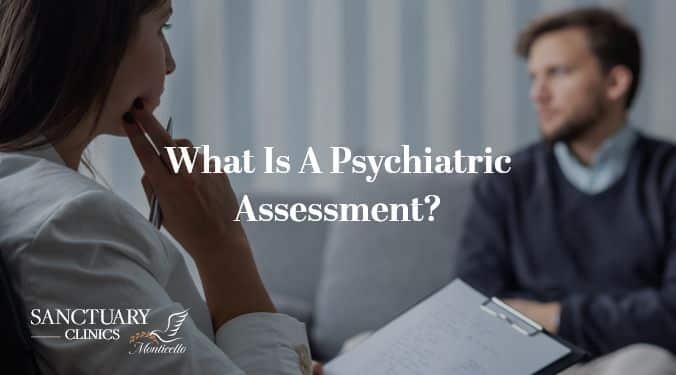A psychiatric assessment is a comprehensive evaluation conducted by a mental health professional. It is much like a physical exam where a doctor tries to identify your health issue.
This crucial step entails the expertise of a certified psychiatrist. They will identify the specific disorder affecting you. By entrusting your assessment to a professional, you pave the way for personalized treatment options. Initial evaluations are done to get an idea of the mental status of the patient. Later on, more thorough tests are conducted.
At Sanctuary Clinic, we offer psychiatric settings and other medical settings. We put the mental health of our patients first, above everything else. We assess the emotional well-being of the patients and always try to offer the right care they need. To know more about psychiatric assessment: its purpose and how it works, keep on reading.
What is the purpose of Psychiatric assessment?
The purpose of psychiatric assessment is simple. It is to identify or possibly diagnose a mental health condition. When you have a physical health issue, you go to the doctor hoping to find the root cause. The doctor suggests certain tests, depending on which he diagnoses you. If you do have an issue, he will prescribe medications or other remedies. Similarly, when you are suffering from a mental health issue, you go to a mental health professional hoping to heal. Navigating the realm of psychiatric illness can be an arduous journey. It is marked by uncertainty and distress.
Conditions like late-life depression or anxiety are not easy for anyone.
Given the elusive nature of these mental afflictions, self-identification often proves challenging. It necessitates expert intervention. Through a comprehensive psychiatric evaluation, depressed patients are thoroughly assessed.
Consequently, this assessment leads to the diagnosis of specific issues or mental illnesses. This ensures that appropriate care is provided to those grappling with psychiatric symptoms. And, we at Sanctuary Clinic are always about offering the appropriate care.
Here is an overview of the purpose of a psychiatric assessment:
- Diagnosis
- Understanding symptoms
- Treatment plan
- Estimation of risk
- Possible treatment outcomes
- Identification of patients at risk
- Offering overall care to the patient
How do Psychiatric assessments work?
At the forefront of unraveling one’s mental health status lies the psychiatric assessment. It is a pivotal initial step in gauging whether specific criteria for a mental health diagnosis are met. Under the expertise of a psychiatrist, you’ll engage in a candid dialogue.
They will delve into your medical history and candidly address any prevailing mental health concerns. Here are certain things that are covered under a psychiatric assessment:
- Individual history
- Family history of major depression or other conditions
- Developmental history
- Social history
- Substance use
- Medical history
- School or Work History
- Mental status
By asking questions related to these topics, the doctor can understand whether or not you fall under any condition. A psychiatric assessment consists of many steps. It is a layered and elaborate process.
Here are some things that come under the assessment:
- Clinical interview
- Symptom assessment
- Medical history and physical examination
- Observation
- Lab tests
- Social and environmental assessment
- Evaluation of risk factors involved
- Estimation of suicide risk
- Assessment of treatment safety
- Patients at risk drinking
- Assessment of substance use disorders
- Collateral information
- Formulation and Diagnosis
- Treatment planning
- Treatment adherence
According to the American Psychiatric Association, there is a certain guideline that a doctor has to follow. Depending on how you answer the questions and what the lab tests say, you will be diagnosed with a condition. If applicable, a diagnosis is made according to the criteria outlined in the relevant diagnostic manuals (e.g., DSM-5 or ICD-10). However, it does not always mean that you have to be diagnosed with mental disorders. Just because you have a few depressive symptoms does not mean that you will have a clinical diagnosis. It is scary being evaluated like that. But, if you do indeed have a condition, getting an expert opinion is going in the right direction of getting it treated. Here are some of the mental health disorders that most psychiatric patients have psychiatric diagnoses of:
- Anxiety
- Depressive disorders
- Eating disorders
- Posttraumatic Stress Disorder or PTSD
- Obsessive-Compulsive Disorder or OCD
- Attention Deficit Hyperactivity Disorder or ADHD
- Bipolar disorder
- Self-inflicted injurious behavior
According to the National Institutes of Health, more than one in five adults in the U.S. live with a mental illness. The total number is almost close to 60 million. Therefore, mental health service use among U.S. adults is quite common.
Get Help Today.
We are here to help you through every aspect of recovery.
Let us call you to learn more about our treatment options.
We are here to help you through every aspect of recovery. Let us call you to learn more about our treatment options.
What are the types of Psychiatric assessments?
There are many types of psychiatric assessments. It is a complex and long process. At Sanctuary Clinic, we make sure to ease the process for our primary care patients.
That being said, there are still different processes that have to be followed.
Diagnostic Interviews
Diagnostic interviews cover a wide range of topics. This is to gather detailed information about an individual’s psychiatric conditions. These interviews are conducted by mental health professionals. You will be asked wide-ranging questions on different topics. Here are some things under mental status examinations that you should look out for:
- Mental health history
- Instances of past psychiatric disorders
- Family history
- Medical history
- Educational and occupational history
- Diagnosis of substance use
- Sleep and appetite
- Trauma and adverse experiences
- Personality and coping mechanisms
The doctor will ask the patient various questions about their behavior, feelings, or thoughts. They will examine the symptoms in detail, including how these symptoms impact the person’s daily activities. Additionally, the doctor will discuss with the patient how they currently cope with and manage their symptoms.
Psychological Tests and Measures
Psychological tests and measures are also conducted to assess the condition better. The tests are to measure the cognitive function of the individual. The information gathered through these tests contributes to the clinical decision-making process. Furthermore, researchers often employ systematic review and meta-analysis methods to examine the effectiveness and validity of different psychological assessment tools. They provide valuable insights for refining the assessment process and answering any clinical question within the field of mental health evaluation. It also contributes to the broader understanding of psychological disease in people. Mainly, these few things are evaluated:
- Ability to recognize shapes and patterns
- Short-term memory
- Focus and concentration
- Problem-solving skills
- Abstract reasoning
- Capacity for decision making
- Capacity for emotional expression
Physical Examination and Lab Testing
Sometimes, symptoms resembling mental health conditions can be caused by physical issues. Contrary to popular belief, your physical condition can impact your mental health largely. For instance, neurologic disorders or thyroid problems. To ensure appropriate treatment, a thorough physical examination can uncover such underlying concerns. The review of systems is an integral part of this assessment. If the symptoms are not linked to physical causes, the psychiatrist proceeds with other investigative tests. These may include urine, blood, or brain screening. The quality of evidence supporting the link between physical health and mental well-being is tremendous. The body of evidence consists of many case studies and assessments that have pointed to the same. By considering the interplay between physical and mental health, clinicians can develop more effective treatment plans. It ultimately improves the well-being and mortality among people with mental health concerns.
The tests are done to identify the root of the issues of schizophrenic patients or patients with other conditions. Additionally, discussions about alcohol or drug use may be part of the assessment. This is to gain a comprehensive understanding of the patient’s situation.
Neuropsychological Evaluations
Neuropsychological evaluations help to understand the ongoing relationship between brain function and behavior. These evaluations are typically performed by neuropsychologists. They are experts in understanding the brain-behavior relationship. They also try to figure out if you have a neurological disorder. Here are some things that are checked under neuropsychological evaluations:
- Cognitive functioning
- Intellectual functioning
- Memory assessment
- Language skills
- Visual-spatial abilities
- Motor skills
- Personality functioning

What are the benefits of a Psychiatric assessment?
There are many benefits of a psychiatric assessment. A mental health issue is never easy to deal with alone. But, a psychiatric assessment can bring you one step closer to having a better life. Here are some of the potential benefits that you can look forward to:
- Accurate diagnosis
- Personalized psychiatric treatment
- Improved self-awareness
- Identifying co-occurring conditions
- Monitoring progress
- Empowerment and validation
- Guidance for family
- Early intervention
What are the components of a Psychiatric assessment?
There are many components of a psychiatric assessment. As you know by now, it consists of different steps. Let us briefly look at them.
Patient’s History and Background
In Psychiatric practice, there is a norm of asking questions related to the patient’s history and background. Family history is very important to understand. This is because, according to a study by the National Institutes of Health in 2013, genes play a factor in mental health conditions. Your doctor will also ask questions related to your personal history.
Clinical Tests
Clinical tests are also conducted. Individuals are often presented with words or phrases to read or recall. They are asked to respond promptly either aloud or in writing for the examiner. Such tests aid in evaluating whether cognitive challenges may be connected to their symptoms. These mental health assessments are made to check your cognitive function. A large percentage of experts believe that clinical tests can be a great way of assessing mental status. Depending on the results, doctors offer treatments and medications. They also take the dose-response relationship into consideration.
What are the questions on a Psychiatric assessment?
There are many key questions in a psychiatric assessment. They are asked so that an accurate diagnosis can be offered. In clinical practice, asking questions is important. This is because, unlike physical exams, an accurate diagnosis can only be provided through the answers. The psychiatrist will engage you in a conversation to comprehend your reasons for seeking help and the symptoms. Being open about any past drug or alcohol use is crucial. It helps mental health specialists gain an understanding of your situation and current symptoms. Being questioned thoroughly in a clinical setting can be scary. But, it is important. Here are some of the questions that you should look out for:
- Have you ever experienced issues with substance abuse in the past?
- Has anyone in your family ever had suicidal behavior or tendencies?
- Is there a family history of mental illness?
- Could you describe your childhood experiences?
- Have you ever encountered situations of abuse in your life?
- Have you had any significant medical conditions or undergone surgeries before?
- Have you faced episodes of panic attacks?
- Have you been experiencing difficulties falling asleep or staying asleep?
- Have you ever received a diagnosis or treatment for any mental health condition?
- Do you have current treatments going on?
- Is there any physical illness bothering you?
- Do you think you show aggressive behaviors?
- Have you had a manic episode in the past?
- Have you had auditory hallucinations?
These are just some instances.
At Sanctuary Clinic, we offer many mental health services and medical health services for the convenience of our patients. We always put our patient satisfaction first. For further information, you can check out information from these institutions and journals:
- S. Department Of Health And Human Services
- Annu Rev Public Health
- American Medical Association
- American Psychiatric Publishing
- National Association Of State Mental Health Program Directors
- Committee On Health Care For Underserved Women
- Hosp Community Psychiatry
- Soc Psychiatry Psychiatr
- Flowers Health Institute
- Health Aff
Get Help Today.
We are here to help you through every aspect of recovery.
Let us call you to learn more about our treatment options.
We are here to help you through every aspect of recovery. Let us call you to learn more about our treatment options.









